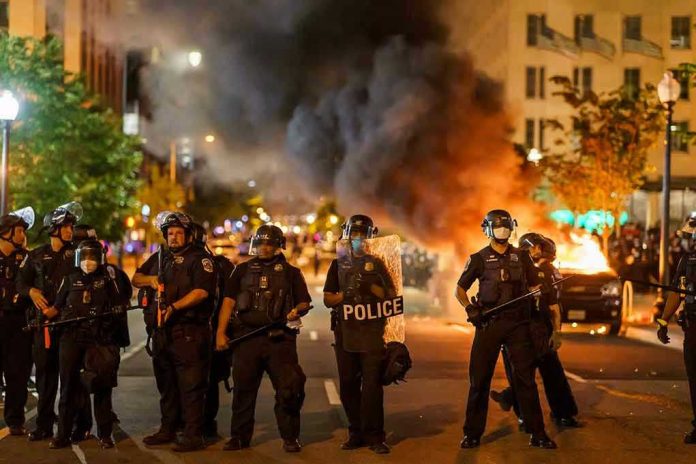
Despite a terrorist designation, Antifa continues to operate freely, igniting conservative calls for decisive action.
Story Overview
- President Trump designated Antifa as a domestic terrorist organization.
- Conservative lawmakers demand stronger enforcement against Antifa.
- International reactions vary, with some countries following the US lead.
- Legal challenges arise over the authority to label domestic groups as terrorists.
Antifa’s Continued Activity Raises Concerns
In September 2025, President Trump signed an executive order declaring Antifa a “domestic terrorist organization,” marking a historic first in the United States. Despite this designation, Antifa-affiliated groups continue to operate, prompting frustration among conservatives who argue for more aggressive governmental action.
The perceived gap between official designations and real-world enforcement fuels calls for further legislative measures to curb Antifa’s influence.
Conservative lawmakers, including Rep. Marjorie Taylor Greene, have introduced resolutions like H.Res.26, urging the Department of Justice to prosecute crimes linked to Antifa. This push aligns with broader conservative demands for a crackdown on left-wing activism, which they view as a threat to public safety and order.
The Trump administration’s efforts reflect a significant shift in national security priorities, away from jihadi threats towards domestic extremism.
International and Legal Reactions
Following the US lead, countries like Hungary have labeled Antifa as a terrorist organization, though responses vary across Europe. While some nations align with US policy, others express concern over legal and democratic norms. The move has sparked international debate over the balance between security and civil liberties, as European governments weigh the implications of following suit.
Legal experts challenge the authority of the President to designate domestic groups as terrorists, citing constitutional concerns. The lack of a statutory basis for such designations raises questions about the broader implications for civil liberties and executive overreach. Critics argue that the designation of Antifa may set a troubling precedent for future actions against domestic movements.
Impact and Future Implications
The designation of Antifa as a terrorist organization has sparked significant political and social debate. In the short term, it may lead to increased law enforcement scrutiny and a potential chilling effect on protest activities. In the long term, the designation could face legal challenges, questioning the boundaries of executive authority and the definition of terrorism within US borders.
As Antifa-affiliated groups reportedly continue their activities, conservative demands for decisive action grow louder. The ongoing debate highlights the tension between ensuring public safety and preserving democratic freedoms, a balance that remains at the heart of this contentious issue.
Despite terrorist designation, Antifa still runs wild — and conservatives want real action https://t.co/RsCGQlPff3
— David Bender (@davycrockettli1) November 24, 2025
This situation underscores the complexities of addressing domestic extremism while respecting constitutional rights, an issue likely to persist in American political discourse.
Sources:
Understanding the Impact of Different Terrorism Designations
Designating Antifa as a Domestic Terrorist Organization
Designating Antifa as a Terrorist Organisation in Europe














